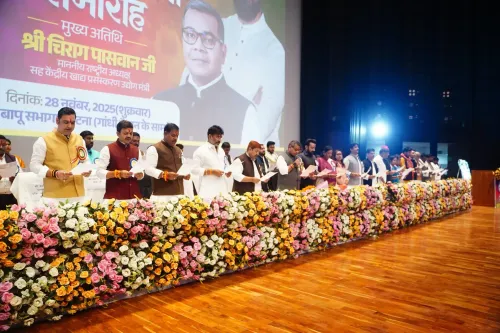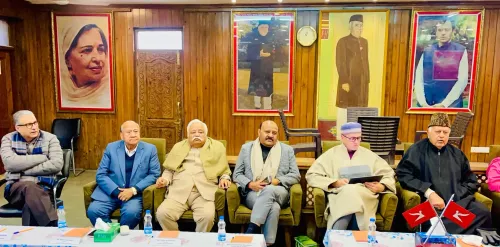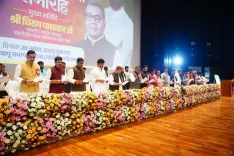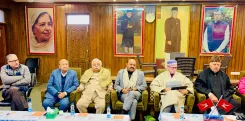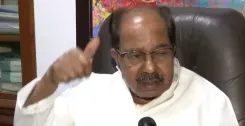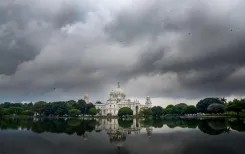What Nine Civic Pledges Did PM Modi Urge After His Visit to Sri Krishna Math?
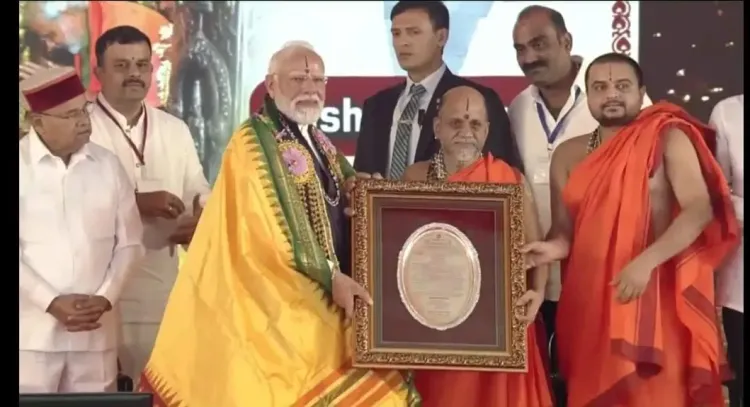
Synopsis
Key Takeaways
- Conserve water and protect rivers.
- Plant trees in honor of loved ones.
- Support local products for economic growth.
- Adopt natural farming practices.
- Integrate yoga into daily life.
Udupi (Karnataka), Nov 28 (NationPress) Prime Minister Narendra Modi made a significant appeal to the nation on Friday, encouraging citizens to embrace nine vital civic pledges. These include water conservation, opting for local products, incorporating millets into diets, reducing the use of oil in meals, and exploring 25 heritage sites across India.
His remarks were delivered to a large audience following the 'Laksha Kantha Gita' chanting at the Udupi Sri Krishna Math in Karnataka's Udupi district.
Prime Minister Modi stated, "The Bhagavad Gita teaches us about our responsibilities. Motivated by this, I request your commitment to nine principles essential for today's world. With the guidance of our seers, these initiatives will be conveyed to the populace."
He elaborated, "The first principle is to conserve water and protect our rivers. Secondly, we should plant trees. The trend of planting trees in honor of one's mother is gaining traction nationwide. If Mutts join this initiative, it will be even more powerful."
"The third principle is to strive to enhance the life of at least one underprivileged individual. I am not asking for anything more," he emphasized.
The Prime Minister further stated, "The fourth principle is to support Swadeshi. As responsible citizens, we should prioritize local goods. India is advancing with the ideals of Swadeshi and Atmanirbhar Bharat. Our economy, employment, and technology are becoming more self-sufficient."
"Thus, we must ardently endorse the 'vocal for local' ethos. The fifth principle is to promote natural farming. The sixth principle is to lead a healthier lifestyle by consuming millets and minimizing oil usage in our diets," he added.
"The seventh principle is to integrate yoga into our daily routines. The eighth principle is to assist in the preservation of manuscripts, as they hold much of our ancient knowledge. The Centre is currently working on the 'Gyan Bharatam Mission' to safeguard this heritage," he remarked.
"Lastly, the ninth principle is a commitment to visit 25 heritage sites in India. I encourage you to visit the Mahabharat Anubhav Kendra in Kurukshetra to experience the life of Lord Krishna. In Gujarat, the annual celebration of Lord Krishna's marriage to Rukmini at the Madhavpur Mela attracts visitors from all over the country, particularly from the Northeast. I urge you to participate next year," the Prime Minister advised.
"The life of Lord Krishna and the teachings of the Gita impart the principles of karma, kartavya, and kalyan. For us Indians, the year 2047 signifies not just Amrit Kaal; it represents our duty to construct a Viksit Bharat. Each individual and institution holds a role in this mission, and the contribution of Karnataka is crucial. All our endeavors should be directed towards the nation. With a sense of responsibility, a Developed Karnataka will facilitate the vision of a Developed India," he added.
"Every time I glimpse Lord Krishna from a small window, it resonates with my connection to Kanaka Dasa's devotion. I feel privileged to have had the chance to express my reverence previously. The teachings of Lord Krishna remain timeless," he concluded.

